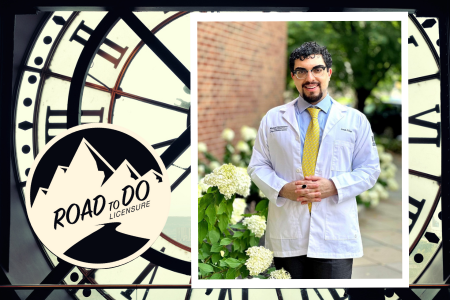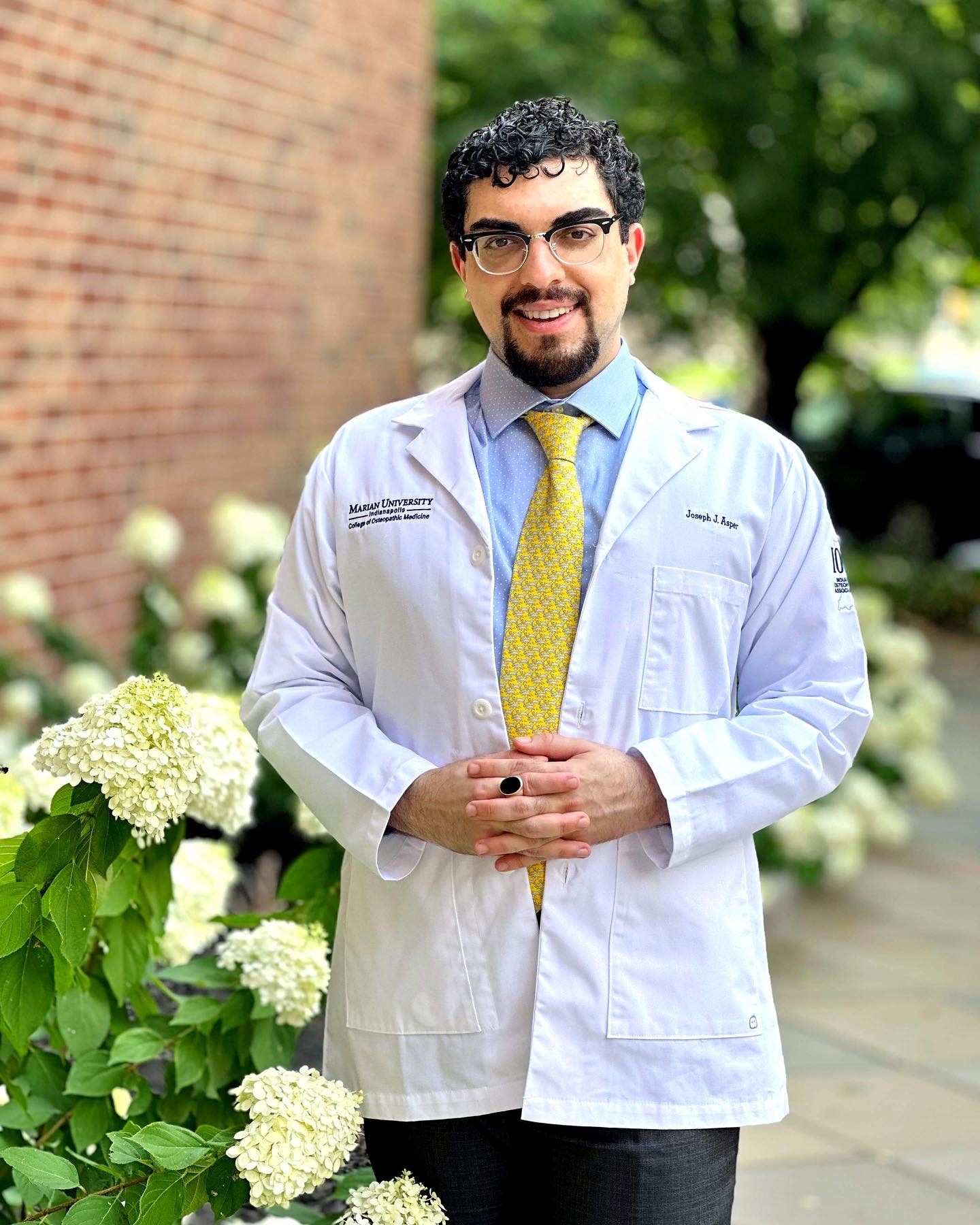Joseph Asper is a third-year osteopathic medical student at Marian University College of Osteopathic Medicine (MUCOM) and a passionate advocate for osteopathic distinctiveness and mental health. We were excited to be able to interview this promising future DO who is looking to bring about change.
Why did you decide to choose osteopathic medicine as a profession?
Coming from an ethnic family with a strong Chaldean culture (a group indigenous to parts of Iraq, Turkey, and Syria), my father often emphasized the importance of maintaining the body to reduce or prevent different illnesses. Iraq and Greece (where I also have family ties) focus on diet and nutrition to prevent illnesses such as obesity and diabetes. Hence why the Mediterranean diet is one of the most recommended diets for healthy living.
This cultural emphasis, compounded by my early interest in the musculoskeletal and nervous systems, pushed me learn about forms of medicine that have a strong foundation of whole-body maintenance. I read Spontaneous Healing by Andrew Weil, MD, and in it, I learned about Robert Fulford, DO, who would travel across the country to help patients with the osteopathic manipulative techniques (OMT) he used.
As I learned more about osteopathic medicine, I learned it embraces the same principles my culture emphasizes. This fueled my passion for anatomy and medicine and I began applying to osteopathic medical schools.
As an undergrad at the University of Houston, I founded a pre-SOMA chapter in order to explore and promote osteopathic medicine to those who might not understand it. I am lucky to have read about OMT from a book, and I hope others can learn about osteopathic medicine through various forms of media, in order to influence others who may not have heard of it before.
How does the osteopathic philosophy stand out to you personally?
I always look to strengthen my relationship with patients and increase positive health outcomes in everyone who seeks my medical care. Osteopathic medicine strongly focuses on prevention, so every aspect of a patient’s life taken into consideration for their diagnosis.
We look at the “why” of symptoms: does a patient present with a cough because they smoke? If so, what social and emotional stressors are causing them to smoke? Questions like these require a deep dive into the understanding of the patient, which gives a more complete picture and emphasizes the holistic approach at the core of osteopathic medicine.
AT Still asked the very question “Why?” when he was caring for the soldiers during the Civil War, and it was this curiosity that led him to rethink how medicine could be practiced to relieve patients’ unnecessary suffering. He realized the body could naturally heal, which is why we spend countless hours learning OMT.
Tell us about how you got the osteopathic medical community involved in your bill to raise awareness of bone marrow donor recruitment and why do you think advocacy is so important?
People in both Iraq and Greece struggle with anemias, and the necessity for bone marrow transplant is high. However, there is a massive lack of both funds and donors to provide patients in need with the necessary stem cell transplantations. There is also a lack of awareness here in the U.S., and I knew change was needed.
I presented the concept of a bill to establish a bone marrow donor recruitment program in my school state of Indiana, which passed the first round of votes. In order to gain more support, I worked with the Indiana Osteopathic Association (IOA) to help spread awareness and education. Many interested organizations sent letters of support and the bill continued to pass through the state Senate and House. I also wanted to work with the IOA to promote the osteopathic profession and show politicians that we represent a community who care for patients both in and out of the clinic. And the result was hopefully an increase in donors to support people in need.
Advocacy requires sacrifice for the greater good, a sense of altruism in which we are called to participate as both citizens and healthcare leaders. In order to bring change and the future generations after us, I cannot stress enough the need for everyone to take action—even if it is something as small as volunteering for a cause that matters to you or someone you know.
What advice do you have for other students or physicians who are also interested in becoming strong advocates for patients and the profession?
In my case, the topic of bone marrow donation is largely unknown unless you know someone who needs a transplant. This lack of awareness means lack of donors. Therefore, one way I can help is to increase education.
Sometimes the issues you feel are important are not known to many, so you find you are the only one talking about it. These are the times where your leadership skills get tested, when you experience growth, and when you can serve as the inspiration for others to get involved.
The greatest leaders started out with their dream and their desire to help others. Through their initial actions, others started to join their movement, and the end result can map out a path for future advocates to follow.
How do you feel about some residency programs not accepting COMLEX-USA?
I only took COMLEX because I firmly believe that the exam tests competency in the osteopathic medical field. I am optimistic that the future will reveal more acceptance for osteopathic students and the bias against DO students will diminish.
My hope is that no program would discriminate against any student, MD or DO, based on which national licensing exam they take.
What are you looking forward to the most in the next stage of your journey?
If my journey were a 100-foot clock tower with 1000 steps, I would have only just stepped through the door at its base.
As a third-year osteopathic medical student, I am seeing everything I’ve learned in the classroom come to life—the application of osteopathic principles, fine-tuning OMT, and building the skills needed to provide the best care to my patients.
With respect to advocacy, I want to work with representatives to introduce more legislation in areas of need, such as mental health and increasing funding for research in rural and veteran populations. The bone-marrow donor recruitment bill also needs work to allow for more provisions that enable donors to take paid leave from work to undergo the multi-step bone marrow donation process.
Finally, I am writing a book on how important it is for healthcare professionals to advocate on public health issues in order to best help patients who are in need. My hope is that other DO students and physicians see the value of advocacy and become leaders and educators, just as AT Still was.


